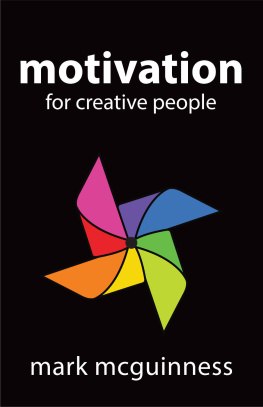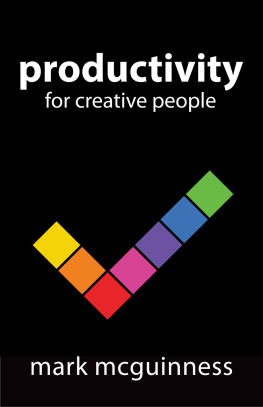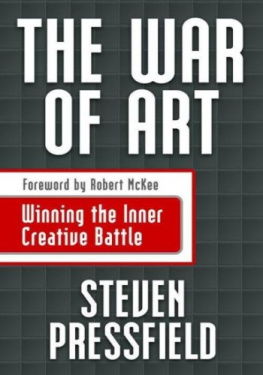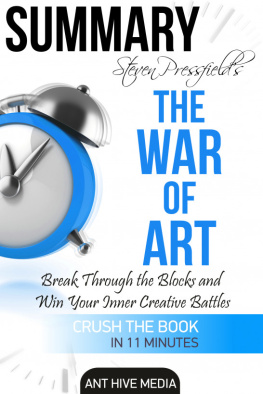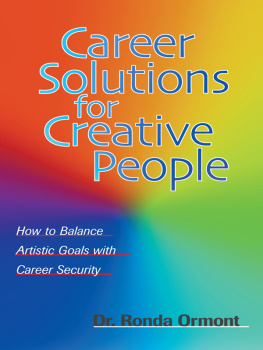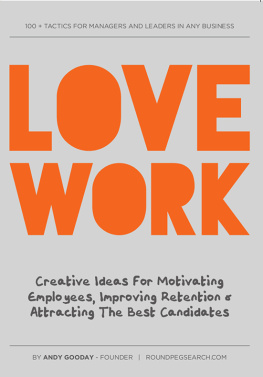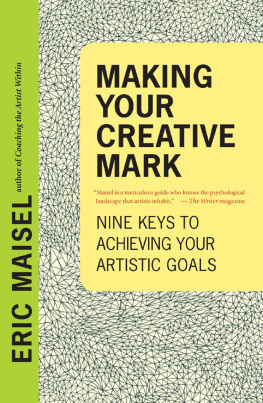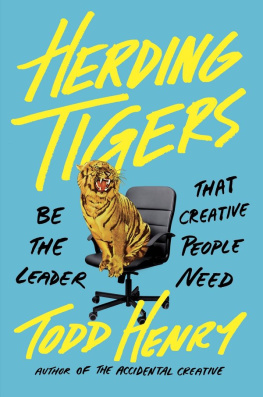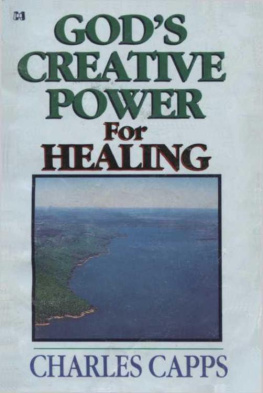
To Mami, Kano, and Issamy best motivations

Getting Started
CHAPTER 1
Beyond working for love
I love my work so much I would do it for free.
Many creative people have uttered these words in a moment of enthusiasmthey express the joy of creative work, and the fact that it often feels more like play than work. They also hint at some of the pitfalls that lie in wait for creatives.
In one sense, creative people have no problem at all with motivation. We fall in love with our creative work, usually early in life, and pursue a career path that allows us to do what we love every day.
We work long, hard, and late through choice, because we enjoy it and we want the end result to be amazing. We dont need anyone to tell us what to do, let alone to motivate us.
We obsess over tiny details most people would never notice, because good enough is not good enough for uswe want the work to be the best it can possibly be.
We have a low boredom threshold, so we are constantly seeking out new challenges. We want to keep stretching ourselves, to keep testing our limits, because thats where the magic happens.
We have a deep urge to follow our dreams, wherever they lead. We want to emulate our creative heroes. To create something extraordinary. To surprise ourselves and astound the world.
Some days we have to pinch ourselves, we feel so lucky that the work that feels like play is our work. Yet the idea that we love our work so much wed do it for free has a sting in its tail
How motivation affects your creativity
Our instinct to work for love rather than money is backed up by a lot of research into the psychology of creativity. The researchers tell us that we are at our most creative when we are driven by intrinsic motivationi.e. working for the sheer joy of it, regardless of rewards. Focusing on extrinsic motivationsuch as money, fame, or other rewardscan be a creativity killer.
So if you dont feel excited by the task in front of you, its impossible to do your most creative and original work, however much money you are offered, or however much pressure you are underfrom your boss, your client, your audience, or yourself.
True artists have always known that the quality of their work depends, in some mysterious way, on the quality of their intention: if we are in this for the money, or the fame, or the awards, the Muse will wrinkle her nose and pass us by. Only when we are truly dedicated to the art itself, for its own sake, will she bestow the gift of inspiration.
Or to put it more prosaically: only when we truly love our work will we put in the time, and take the care, to do it to the best of our ability. To keep learning and refining our skills all our lives. To first master our craft and then elevate it to the level of art.
But creative professionals cant ignore rewards
Have another look at these words:
I love my work so much I would do it for free.
We dont say, I will do it for free, but, I would do it for free. The would implies in an ideal world, or if I didnt have to earn a living. But we do not live in an ideal world.
Working for love is all well and good, but if you are a creative professionalmeaning you aspire to create work to a professional standard, and/or earn your living from your creativitythere is always something at stake beyond the work itself. Here are three of the big ones:
Money
If your creative work is your main occupation, you cant ignore money. You need to be paidand paid well, if you want to live well. If youre doing high quality work, youre creating a lot of value, so why shouldnt you reap the rewards? To do this, you need to find a way to resolve the creativity versus money dilemma.
Fame
Part of the pleasure of creating something amazing is sharing it with other people and experiencing their delight in your workwhether a live audience, enthusiastic customers and collectors, or legions of followers online. Its not just a matter of ego: in some creative industriessuch as film, music, literature, and dramafame is essential to earning a living, since your income is proportional to the number of tickets, downloads, or copies you sell.
Reputation
Sometimes called artistic reputation or critical reputation, this is similar to fame, in that it is about others perceptions of you. The difference is that fame is about the number of people who know about you, regardless of their opinion of your work; reputation is about how your work is perceived by industry thought leaders (practitioners, critics, connoisseurs, and enthusiasts) and involves a value judgment. Its possible to be very famous with a low artistic reputation, and vice versa. For some creators, especially in the fine arts, reputation is even more desirable than fame or money.
If you are serious about pursuing a creative careerwhether in the arts, commercial creativity, or as an entrepreneuryou cannot succeed without pursuing rewards.
You need money to pay the bills, fund your projects, and take care of yourself and your family. In many fields you may not need to be famous, but you do need a good reputation within your professional network. And if youre in a fame-driven industry, you need a powerful public profile, whether or not you enjoy the limelight.
But in the pursuit of these rewards you encounter a number of threats to your creativity, motivation, and resilience:
Selling yourself short
Some creatives try to ignore money: they fail to promote their work, shy away from money conversations, and accept low fees out of fear. But if you sell yourself short, you end up working long hours for little money; you are constantly tired, overworked, and stressed about money. Not only that, but you can feel resentment towards your clients and customers, which makes it impossible to do your best work for them.
Selling out
The opposite of ignoring money is focusing on it too much. You embrace money, celebrity, and the trappings of success, but lose your creative soul. Even if this pays off financially, you cannot feel fulfilled without creating great work. Inevitably, your artistic reputation will suffer. You might think that would be a nice problem to have,but having coached creatives who have lost their way in the maze of success, I can assure you its not a good place to be.
The weight of expectation
When lots of people are watching you, and theres a lot riding on the outcome, its hard to do something for the sheer joy of it. The weight of expectation can be experienced directly, in the presence of a live audience; indirectly, via the media and social media; or via money, in the form of high fees, advances, or royalty checks. For performers, this can cause stage fright. For creators it can lead to procrastination, difficult second album syndrome, and creative blocks.
Comparisonitis
Another way to block your creativity is to look at the achievements of your peers, or the biggest names in your field, or your creative heroesand compare yourself unfavorably to them. When you look at the fame, fortune, and reputation they have amassed, you feel inadequate, intimidated, and creatively paralyzed.
Professional jealousy
This is similar to comparisonitis in that it involves focusing on your peers and the big names. But instead of thinking, Ill never be as good as them, you think, Im better than them! Why are they getting all the recognition? In this scenario, you are paralyzed by jealousy and resentment rather than fear, but the effect on your creativity is just as deadly.
Next page
